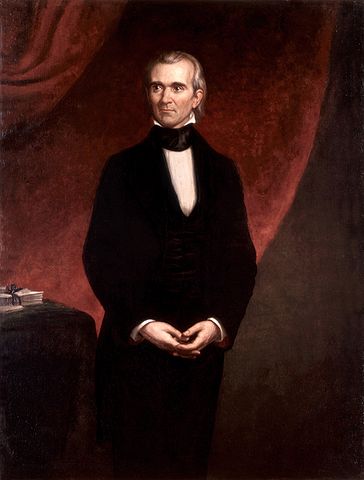
portrait by George Peter Alexander Healy, 1858
(1795 - 1849)
The 'dark horse' candidate in the 1844 presidential election,
James K. Polk, a sly, misanthropic man with hard and jewel-like
gray eyes that "gave up nothing," was elected the 11th president of
the United States.
Polk, a
back woodsman from Tennessee who was dubbed Young Hickory in
reference to his ideological predecessor, Andrew Jackson, was, in
John Quincy Adam's words, a man with "no wit, no literature, no
gracefulness of delivery, no elegance of language, no philosophy,
no pathos, nofelicitous inpromptus." Americans, from time to
time, seem determined to elect men crafted from the banal.
Given his
many faults and character flaws, Polk was a fierce and determined
expansionist. There was about his presidency an acute sense
of deadline, and it must be said that he made the most of that
urgency. In four short years he more than doubled the size of
the nation by goading Mexico into war thru illegal acts of
aggression (thanks to Zachary Taylor), accepting Texas and
California as new states, and settling the long-standing dispute
over the Oregon Territory with England, thereby pushing the
nation's territorial boundary to the Pacific Ocean -- an
achievement that would have seemed preposterous just ten years
before. (Click here for more on Polk)
Polk was
a childless and cheerless man who seemed fueled by a secret
agenda. With Manifest Destiny under his arm, the population
picked him to do bold things in short order, and he did them.
"He seemed to spring from nowhere, and to nowhere he returned after
wrenching great change into the world," said one historian.
Four
years was all he needed. He limped home to Tennessee,
exhausted and ill, and died two months later, leaving the world a
very different place than the one he found when he stepped into the
White House in 1845.
Related People
Related Events
Related Flashpoints
Related Places